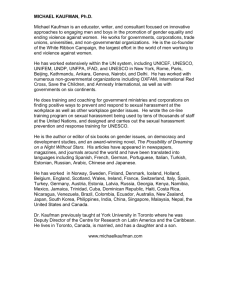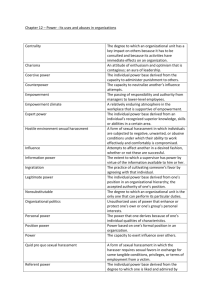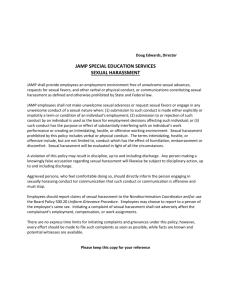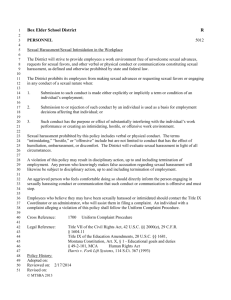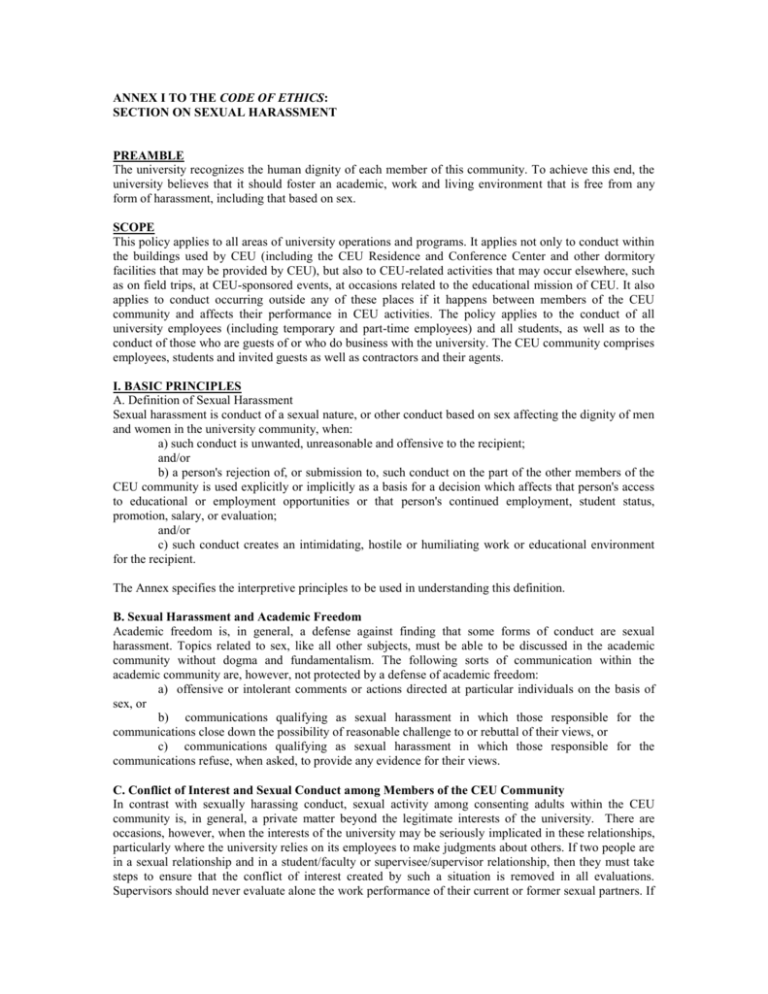
ANNEX I TO THE CODE OF ETHICS:
SECTION ON SEXUAL HARASSMENT
PREAMBLE
The university recognizes the human dignity of each member of this community. To achieve this end, the
university believes that it should foster an academic, work and living environment that is free from any
form of harassment, including that based on sex.
SCOPE
This policy applies to all areas of university operations and programs. It applies not only to conduct within
the buildings used by CEU (including the CEU Residence and Conference Center and other dormitory
facilities that may be provided by CEU), but also to CEU-related activities that may occur elsewhere, such
as on field trips, at CEU-sponsored events, at occasions related to the educational mission of CEU. It also
applies to conduct occurring outside any of these places if it happens between members of the CEU
community and affects their performance in CEU activities. The policy applies to the conduct of all
university employees (including temporary and part-time employees) and all students, as well as to the
conduct of those who are guests of or who do business with the university. The CEU community comprises
employees, students and invited guests as well as contractors and their agents.
I. BASIC PRINCIPLES
A. Definition of Sexual Harassment
Sexual harassment is conduct of a sexual nature, or other conduct based on sex affecting the dignity of men
and women in the university community, when:
a) such conduct is unwanted, unreasonable and offensive to the recipient;
and/or
b) a person's rejection of, or submission to, such conduct on the part of the other members of the
CEU community is used explicitly or implicitly as a basis for a decision which affects that person's access
to educational or employment opportunities or that person's continued employment, student status,
promotion, salary, or evaluation;
and/or
c) such conduct creates an intimidating, hostile or humiliating work or educational environment
for the recipient.
The Annex specifies the interpretive principles to be used in understanding this definition.
B. Sexual Harassment and Academic Freedom
Academic freedom is, in general, a defense against finding that some forms of conduct are sexual
harassment. Topics related to sex, like all other subjects, must be able to be discussed in the academic
community without dogma and fundamentalism. The following sorts of communication within the
academic community are, however, not protected by a defense of academic freedom:
a) offensive or intolerant comments or actions directed at particular individuals on the basis of
sex, or
b) communications qualifying as sexual harassment in which those responsible for the
communications close down the possibility of reasonable challenge to or rebuttal of their views, or
c) communications qualifying as sexual harassment in which those responsible for the
communications refuse, when asked, to provide any evidence for their views.
C. Conflict of Interest and Sexual Conduct among Members of the CEU Community
In contrast with sexually harassing conduct, sexual activity among consenting adults within the CEU
community is, in general, a private matter beyond the legitimate interests of the university. There are
occasions, however, when the interests of the university may be seriously implicated in these relationships,
particularly where the university relies on its employees to make judgments about others. If two people are
in a sexual relationship and in a student/faculty or supervisee/supervisor relationship, then they must take
steps to ensure that the conflict of interest created by such a situation is removed in all evaluations.
Supervisors should never evaluate alone the work performance of their current or former sexual partners. If
they fail to take such steps and a conflict of interest is created, this will be a violation of the university's
ethics code.
D. Maliciously or Knowingly False Allegations
If anyone makes a maliciously or knowingly false allegation of sexual harassment under this policy, then
this is also a violation of the sexual harassment policy and is grounds for discipline and/or remedial action.
If a person has been found to be maliciously or falsely accused of sexual harassment, then remedial
measures must be taken to ensure that the person's reputation is not damaged by the charges.
E. Retaliation
Retaliatory conduct against any individual who has filed a complaint of harassment, who has reported
witnessing harassment, or who has participated in the harassment complaint process is also a violation of
the sexual harassment policy and is grounds for discipline and/or remedial action. In cases where the victim
of retaliation has suffered harm, action should be taken to ameliorate the effects of the illegitimate
retaliation.
II. PROMULGATION
This policy shall be published in the official handbooks for faculty, staff, and students, and shall be made
available widely within the university community, together with information about the procedures, which
are currently in place for resolving situations arising under this policy. University contractors should also
be given a copy of the policy and procedures, and should be informed that it applies to their agents and
employees who work as part of the university community. A copy of the policy and procedures should be
posted also on the CEU Web Page.
An orientation meeting for faculty, staff and students to acquaint them with this policy and the relevant
procedures for enforcing it shall occur at the beginning of the academic year, and those who enter the
university community as faculty, staff, students or visitors during the academic year should be given a
written copy of the policy and applicable procedures.
ANNEX: SECTION ON SEXUAL HARASSMENT
What Constitutes Sexual Harassment
The definition of sexual harassment in the university's code of ethics is taken from the European
Commission's Recommendation on the Protection of the Dignity of Women and Men at Work, 92/131/EEC.
Sexual harassment means unwanted conduct of a sexual nature or other conduct based on sex affecting the
dignity of women and men in the university community. This can include unwelcome physical, verbal or
non-verbal conduct. Thus, a range of behaviors may be considered to constitute sexual harassment.
The essential characteristic of sexual harassment is that it is conduct of a sexual nature or other conduct
based on sex that is unwanted by the recipient. This means that it is for each individual to determine what
behavior is acceptable to them and what they regard as offensive. Friendly behavior is distinguishable from
sexual harassment because friendly behavior is welcome and mutual while sexual harassment is unwanted
by the recipient.
In considering whether conduct amounts to sexual harassment, the unwanted nature of the conduct must be
weighed against standards of reasonableness in the community. Therefore, the definition specifies not only
that the sexually harassing conduct is unwanted by the recipient but also that it is unreasonable in the
setting. This is meant to require an objective as well as a subjective element in the definition of sexual
harassment.
Given that CEU is a multicultural community in which sexual understandings and attitudes may vary
widely, it may be difficult because of the cultural and personal differences between the initiator and the
recipient for initiators to distinguish in advance what will be seen by a recipient as unwanted conduct from
that which would be seen by a recipient as friendly. A recipient of unwanted sexual attention has the
obligation to make known either directly or indirectly to the initiator that the attention is unwelcome before
the conduct can be considered harassment under part (a) or (c) of the definition. If, when notified that the
conduct is unwanted, the initiator stops at that point, the conduct is not sexual harassment even if it was
unwanted the first time. If the initiator of the conduct persists after the recipient has made clear that the
conduct is unwanted, then the conduct may be considered sexual harassment.
In some severe cases, a single instance (for example, something that would be rape, assault, blackmail or
kidnapping under local criminal laws) can be considered serious enough to be sexual harassment without a
requirement of advance notice, but in general, notice to the initiator is required before the conduct will be
considered sexual harassment under part (a) or (c) of the definition.
A particularly serious form of sexual harassment arises under part (b) of the definition when a member of
the university community conditions some benefit or penalty on the recipient's acquiescence in or
resistance to the conduct of the initiator. It is equally a violation of this policy if the recipient resists and
suffers the threatened harm or submits and thus avoids the threatened harm. For example, if a faculty
member or supervisor conditions a grade, an evaluation, participation in an educational or work-related
program or activity, a recommendation or an educational or career decision upon a student's or employee's
submission to unwelcome sexual advances, requests for sexual favors or other verbal, non-verbal or
physical conduct of a sexual nature, then this would count as sexual harassment under part (b) of the
definition. Acquiescence in the conduct or failure to complain does not always mean that the conduct was
welcome, especially if the initiator of the sexual conduct was in a position to control something vital to the
interests of the recipient. Such determinations of welcomes must be made on a case-by-case basis. If such
conduct is welcomed by both sides, it is not strictly speaking sexual harassment, but it may nonetheless
create a conflict of interest.
Sexual harassment may also be created, as part (c) of the definition anticipates, when sexually harassing
conduct is sufficiently severe, persistent or pervasive to limit a student's or employee's ability to participate
in or benefit from an educational program or work-related activity. In deciding whether conduct creates an
intimidating, hostile or humiliating educational or work environment, both subjective features (i.e. the
views of the recipient) and objective features (i.e. how the conduct appears when seen within the context)
should be considered. For a hostile environment to exist, the conduct must have limited the ability of the
student to participate in or benefit from the educational environment of CEU or must have limited the
ability of the employee to perform up to their capacities in their work environment at CEU. Generally, to
find that conduct is problematic enough to create a hostile environment, it must be sustained and nontrivial.
The more severe the harassing conduct, however, the less need there is to show a repetitive series of
incidents.



